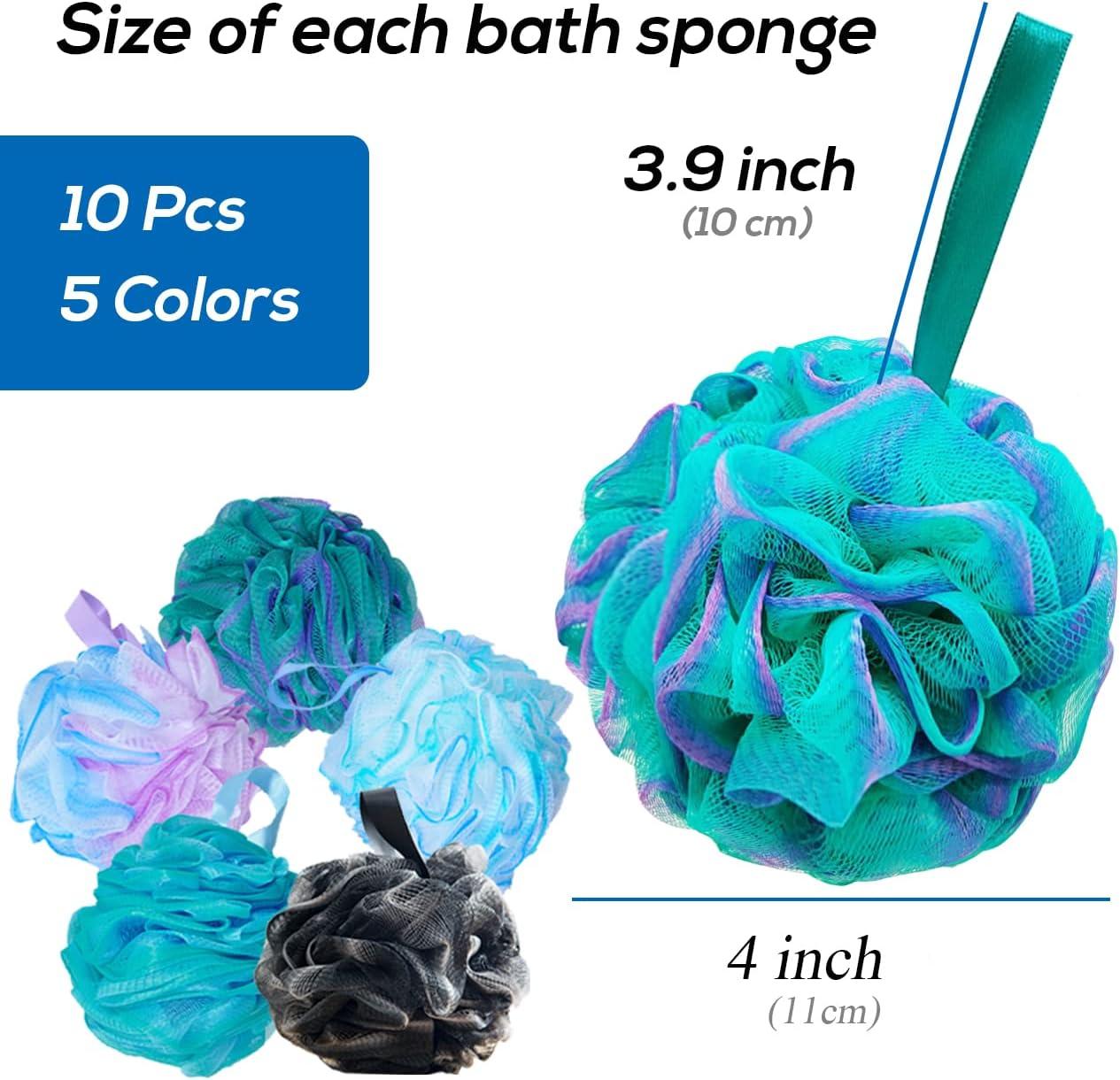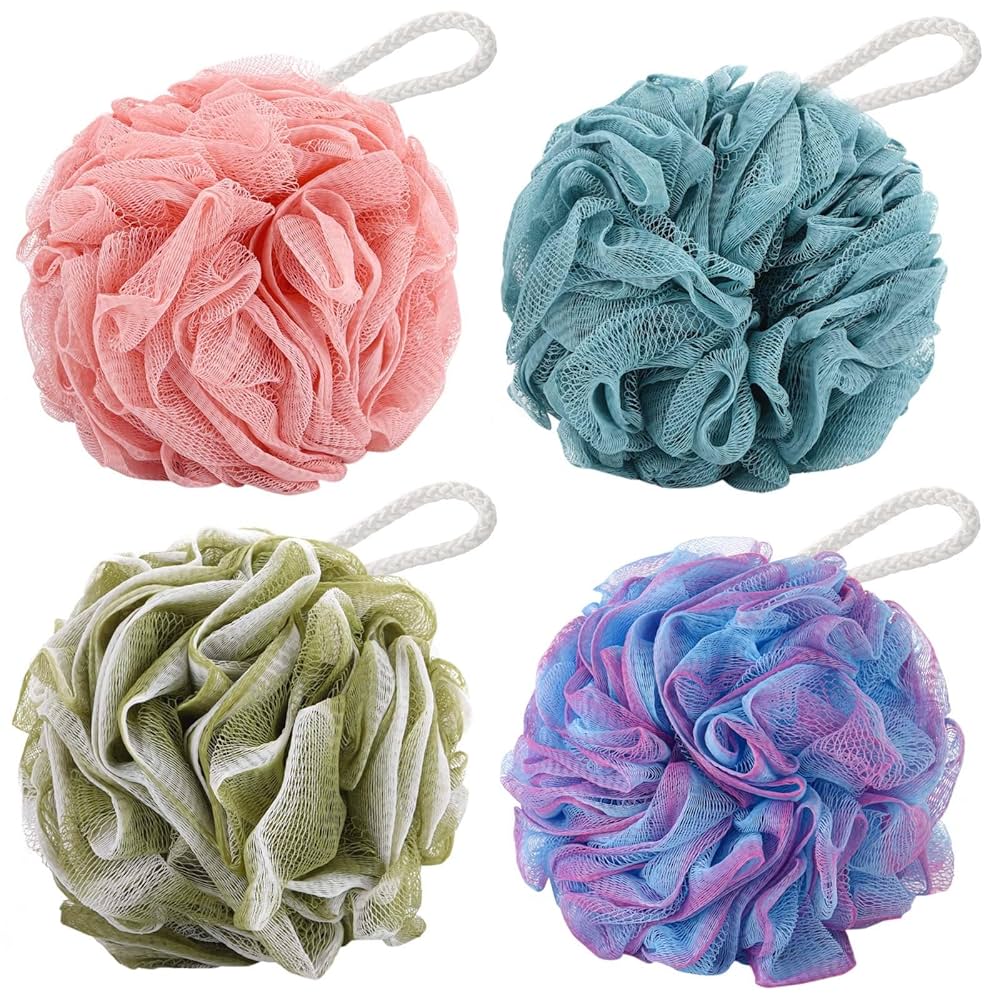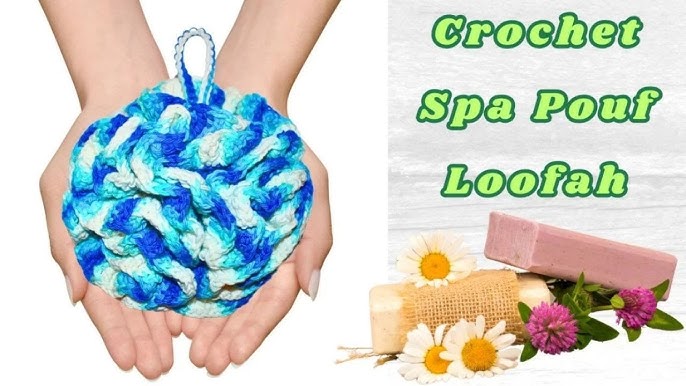Have you ever wondered what makes your shower pouf so soft and effective at cleaning your skin? Knowing what a shower pouf is made of can change the way you see this everyday bathroom essential.
It’s not just about looking pretty or creating bubbles—it’s about how the materials affect your skin and the environment. Keep reading to discover the surprising facts behind your shower pouf’s ingredients and why it matters for your daily routine. This knowledge might just transform how you choose and use your next one.

Credit: www.gosupps.com
Common Materials In Shower Poufs
Shower poufs come in different materials that affect their texture, durability, and eco-friendliness. Knowing what your pouf is made of can help you choose one that suits your skin type and cleaning habits. Let’s look at the common materials found in shower poufs and what makes each unique.
Nylon And Its Popularity
Nylon is a widely used material in shower poufs because it’s strong and dries quickly. It resists mold and mildew better than many other materials, which keeps your pouf fresher for longer. If you want a pouf that lasts through many showers without falling apart, nylon is a solid choice.
Polyester Variants
Polyester is another synthetic option that offers softness and durability. It feels gentle on the skin, making it suitable for those with sensitive skin. Some polyester poufs come in textured weaves that create more lather, helping your soap spread evenly during your shower routine.
Natural Fiber Options
Natural fibers like cotton or sisal are less common but appeal to eco-conscious shoppers. These materials biodegrade more easily and avoid the chemicals sometimes found in synthetics. If you’re looking to reduce plastic use, natural fiber poufs provide a more sustainable choice without sacrificing exfoliation.
Eco-friendly Shower Pouf Alternatives
Choosing an eco-friendly shower pouf can make a big difference in reducing plastic waste and supporting sustainable living. Many conventional poufs are made from synthetic materials that don’t break down easily. Luckily, there are natural alternatives that feel great on your skin and help protect the planet.
Bamboo Fiber Poufs
Bamboo fiber poufs offer a soft yet durable option for your shower routine. Bamboo grows quickly without the need for pesticides, making it a highly renewable resource. These poufs naturally resist bacteria and dry faster than synthetic ones, which means less chance for mold to grow.
Have you noticed how some shower accessories stay damp and smelly for days? Switching to bamboo fiber could solve that problem while being kinder to the environment. Plus, bamboo’s natural texture gently exfoliates your skin without being harsh.
Organic Cotton Poufs
Organic cotton poufs feel familiar and comforting because cotton is naturally soft and breathable. When grown organically, cotton avoids harmful chemicals and uses less water compared to conventional farming. This reduces the environmental impact while still giving you a gentle cleanse.
Using an organic cotton pouf can also support fair-trade farming communities, adding a social benefit to your purchase. You might be surprised how well these poufs hold up over time, especially when you hand wash and air dry them.
Loofah And Plant-based Materials
Loofahs are made from the fibrous interior of a gourd-like plant, offering a 100% natural scrubber. They break down quickly after disposal, leaving no plastic behind. Using a loofah also provides a stimulating exfoliation that boosts circulation and removes dead skin effectively.
Besides loofahs, other plant-based materials like hemp or jute can be crafted into shower scrubs. These options often come without dyes or synthetic treatments, making them safer for sensitive skin. How often do you consider what your shower tools are made of and where they end up?
How Material Affects Durability
The material of your shower pouf plays a huge role in how long it lasts and how well it performs. Different fabrics hold water differently, dry at various speeds, and can resist mold and mildew to varying degrees. Understanding these differences helps you pick a pouf that stays fresh and durable, saving you money and hassle.
Water Retention And Drying Time
Materials like nylon and mesh tend to hold less water, allowing the pouf to dry faster. Quick drying means less chance for bacteria to grow, keeping your pouf cleaner between uses. On the other hand, natural fibers like cotton soak up more water and can stay damp for longer periods, which isn’t ideal for a wet environment like the shower.
Have you noticed how some poufs feel heavy after a shower? That’s often water trapped inside. Choosing a fabric that dries quickly can make your daily routine feel fresher and more hygienic.
Resistance To Mold And Mildew
Mold and mildew love damp, slow-drying places. Synthetic fabrics like nylon and polyester are less prone to mold because they don’t absorb much water. Natural materials, while soft, can develop mold faster if not dried properly.
Think about your last shower pouf — did it start to smell after a while? That’s a sign of mold growth. Opting for a material resistant to mold can keep odors away and extend the life of your pouf.
Longevity Of Different Fabrics
Nylon and polyester poufs usually last longer because they resist tearing and drying out. They maintain their shape and texture after many uses and washes. Cotton and other natural fibers may feel softer but tend to break down faster with regular exposure to water and soap.
Would you prefer a pouf that stays fluffy and strong for months, or one that needs replacing often? Picking a durable fabric can reduce waste and save you trips to the store.

Credit: mhtwobirds.en.made-in-china.com
Impact On Skin And Cleaning
The material of a shower pouf plays a crucial role in how it affects your skin and how you clean it. These small, mesh-like accessories can either enhance your shower routine or cause skin irritation and hygiene issues if not chosen or maintained properly. Understanding their impact helps you make better decisions for your daily self-care.
Gentleness And Exfoliation
Shower poufs are usually made from synthetic materials like nylon or polyethylene, which create a soft yet slightly abrasive texture. This texture helps remove dead skin cells, leaving your skin feeling smooth and refreshed.
However, if you have sensitive skin, a pouf that’s too rough can cause redness or irritation. You might notice that using a coarser pouf daily leaves your skin dry or even inflamed. Choosing a gentler pouf or limiting exfoliation to a few times a week can protect your skin’s natural barrier.
Bacterial Growth Concerns
Because shower poufs stay wet and warm, they can become breeding grounds for bacteria, mold, and mildew. This buildup can lead to unpleasant odors and potentially cause skin infections or acne flare-ups.
Have you ever noticed your pouf smelling musty after a few days? That’s a sign of bacterial growth. It’s important to be aware of this risk, especially if you have cuts, sensitive skin, or other skin conditions.
Best Practices For Maintenance
- Rinse your pouf thoroughly after every use to remove soap and dead skin.
- Hang it in a well-ventilated area to dry completely between showers.
- Replace your pouf every 3 to 4 weeks to minimize bacteria buildup.
- Occasionally soak it in diluted vinegar or a mild bleach solution to disinfect.
- Avoid sharing your pouf with others to reduce cross-contamination.
Taking these simple steps can keep your shower pouf clean and your skin healthy. What maintenance habits have you found most effective for your skincare tools?
Choosing The Right Shower Pouf Material
Shower poufs are usually made from soft mesh or nylon materials. These fabrics create rich lather and gently exfoliate skin. Choosing the right material affects durability and comfort during use.
Choosing the Right Shower Pouf Material When you step into the shower, the choice of your pouf material can greatly affect your bathing experience. The right material can offer both comfort and effectiveness in cleansing. But with so many options available, how do you decide which is best for you?Considerations For Sensitive Skin
If you have sensitive skin, your shower pouf material matters even more. Natural fibers like cotton and bamboo are often gentler on the skin, reducing the risk of irritation. Synthetic materials can sometimes be abrasive, so if you experience redness or discomfort, it might be time to switch to a softer option.Sustainability Factors
In today’s world, sustainability is an important consideration. Materials like bamboo and organic cotton are renewable and biodegradable, making them eco-friendly choices. By opting for sustainable materials, you not only care for your skin but also contribute positively to the environment.Cost Vs. Quality
It’s tempting to go for the cheapest option, but does it really save you money in the long run? Higher-quality materials may cost more upfront but often last longer, providing better value over time. Consider what balance between cost and quality works best for your budget and needs. Choosing the right shower pouf material is more than just about luxury—it’s about enhancing your daily routine while considering your skin and the planet. What will your next choice be?
Credit: www.amazon.ca
Frequently Asked Questions
What Materials Are Commonly Used To Make Shower Poufs?
Shower poufs are usually made from nylon or polyethylene mesh. These synthetic materials create a soft, airy texture that helps produce a rich lather. They dry quickly, preventing bacteria growth, and are durable enough for daily use in wet environments like showers.
Are Natural Fibers Used In Shower Poufs?
Most shower poufs are made from synthetic fibers, but some eco-friendly options use natural materials like cotton or sisal. Natural fiber poufs are biodegradable and gentle on the skin, but they may not dry as quickly or last as long as synthetic versions.
How Do Synthetic Materials Benefit Shower Poufs?
Synthetic materials like nylon enhance durability and quick drying. They resist mold and mildew better than natural fibers. These materials create a dense foam with less soap, improving cleansing efficiency. Overall, synthetics make shower poufs hygienic and long-lasting.
Can Shower Poufs Cause Skin Irritation?
Shower poufs made from rough or low-quality materials can irritate sensitive skin. Choosing soft, high-quality nylon or natural fibers helps reduce irritation. Regularly cleaning and replacing your pouf also prevents bacteria buildup, keeping your skin healthy.
Conclusion
Shower poufs are mostly made from soft, synthetic mesh materials. These materials help create a rich lather and gently clean the skin. They dry quickly, reducing the chance of bacteria growth. Choosing the right pouf can improve your shower experience.
Keep it clean by rinsing and letting it air dry. Replace it regularly to stay fresh and hygienic. Now you know what makes up a shower pouf and why it matters. Simple, practical, and easy to use every day.





